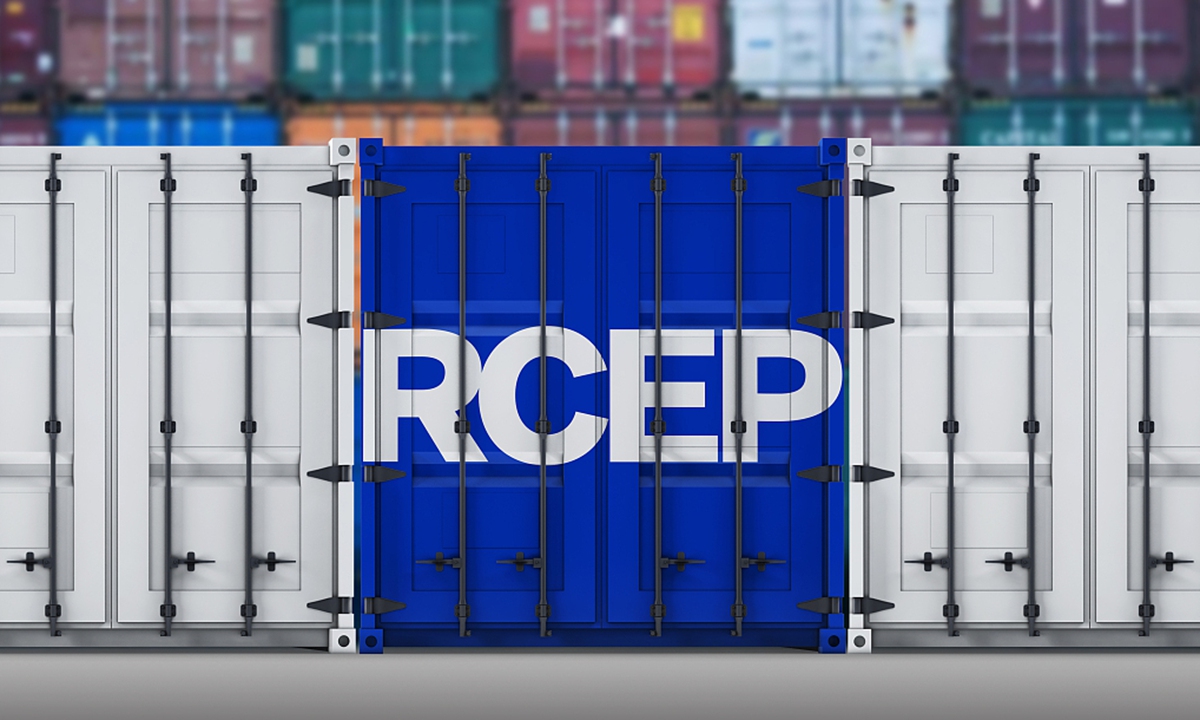
RCEP Photo:VCG
Thanks to the colossal Chinese market and the Regional Comprehensive Economic Partnership (RCEP), which came into force at the beginning of the year, multinationals remain optimistic over the Chinese market, with more than 90 percent of the surveyed firms from the RCEP members expecting to expand trade with China, according to a new survey.
The special series survey conducted by HSBC for the ongoing 5th China International Import Expo (CIIE) in Shanghai revealed that 82 percent of the surveyed firms expect growth for their businesses in China in the next year, and 93 percent expect more trade with China, with the RCEP unleashing potential.
The survey covered nearly 3,400 firms from 16 major markets across the world, including nine RCEP members and seven major economies of the world.
The ongoing CIIE is the world's first import-themed national-level expo. Enterprises from 127 countries and regions are attending the event, including those from all the member states of the RCEP - the world's largest free trade deal to date, according to the Xinhua News Agency.
Teh-han Chow, CEO of greater China for New Zealand-based dairy producer Fonterra, told the Global Times on Monday that China is Fonterra's biggest single market globally, accounting for about one-third of its total business, and the importance of the Chinese market will no doubt continue for the company.
"As a rule-based trade pact, the RCEP will enhance the consistency and efficiency of cross-border trade among signatory countries. As a company involved in the export and import of goods, we are glad to see the trade pact generating a positive effect," Chow said. "RCEP markets currently account for about 50 percent of Fonterra's total business, and as the RCEP exerts its effect, we expect that ratio to be further lifted."
The average intake of dairy products in China is way lower than in the developed economies of East Asia, hence the potential is huge for companies like Fonterra, Chow said.
Charlie Teo, CEO of Singaporean massage chair maker OSIM, told the Global Times on Monday that the economic gravity center is shifting from the west to the east. The RCEP stands to enhance the level of cooperation with member countries and among businesses. "This deal will allow us to consolidate our position ... in the Chinese market," Teo said.
Teo said OSIM has been making preparations to embrace the RCEP, and "as our company chairman has said, if we lose the Chinese market, we lose the world. The RCEP is our once-in-a-life-time opportunity."
The RCEP has added momentum to the development of the China-Thailand partnership. Today, the RCEP and the CIIE together will bring more benefits by helping to further promote regional cooperation and supporting the implementation of the Belt and Road Initiative, Saravoot Yoovidhya, the CEO of the Thailand-based beverage and snack producer TCP Group, told the Global Times.
TCP Group looks forward to sharing in new opportunities offered by the Chinese market through greater regional cooperation and China's continued opening-up. "We are more determined than ever to invest more in the Chinese market, further expand and deepen our Chinese business activities, and bring more high-quality products to Chinese consumers," he said.
Trade between China and other RCEP members stood at 8.32 trillion yuan ($1.15 trillion) in the first eight months of the year, accounting for nearly one-third of China's total foreign trade.
From January to October, the ASEAN bloc remained China's largest trading partner, with bilateral trade of 5.26 trillion yuan, up 15.8 percent year-on-year, according to data from the General Administration of Customs.
Commenting on the HSBC survey, China's Foreign Ministry spokesperson Zhao Lijian said on Monday that China is implementing a more active opening-up strategy to establish a high-standard free trade zone network. China will keep promoting high-standard opening-up, make it easier for foreign companies to invest and operate in China, and further promote trade and investment liberalization and facilitation.
Against the backdrop of the gloomy global economy, the RCEP has offered a valuable opportunity for businesses, Zhao Gancheng, a research fellow at the Shanghai Institute for International Studies, told the Global Times on Monday.
The RCEP comprises 15 Asia-Pacific economies, including 10 ASEAN member states, China, Japan, South Korea, Australia and New Zealand.




